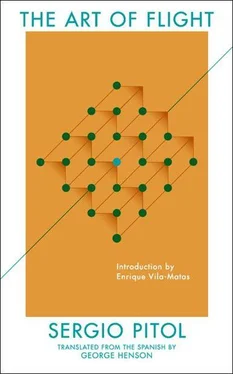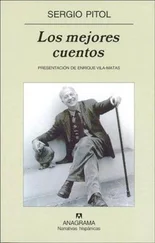24 JUNE
I don’t think there will be the slightest doubt in the reader’s mind that the plot revolves around a settling of accounts between the various Mexican fascist groups during the days immediately following the official declaration of war. The character Briones is a spent cartridge. He’s trapped, doomed before the fact. What remains unclear — but the lack of clarity, the gap in the story, seems necessary to me — is his past in Berlin. The death of his first wife, for example, the agreements he reached in Germany, and with whom, before returning to Mexico. Should I allude more openly to his sexual impotence so that the reader will begin to question the ghostly aspect of their married life? What role does the Jewish doctor, whose ex-wife, also Jewish, Briones ends up marrying, play? But these, in my judgment, are matters for another novel.
26 JUNE
My stay in Mojácar and the novel are finished. Its title: El desfile del amor (Love’s Parade). Day after tomorrow, I’ll be in Barcelona to hand it over to Jorge Herralde at Anagrama. 12From there, I’ll fly to Prague where I’ll await, terrified, if there is a finding, the jury’s verdict.

12 Publisher Jorge Herralde is the founder of the prestigious publishing house Editorial Anagrama and namesake of the Herralde Novel Prize, which the novel Pitol references here would win that same year. The prize, which is awarded to an unpublished text and includes publication, has been responsible for launching numerous literary careers. Subsequent winners include Roberto Bolaño, Enrique Vila-Matas, and Juan Villoro. —Trans.
As is known, a charm is an object or animal to which supernatural properties are attributed, beneficial to whomever possesses it.
I do not own anything to which I could honestly ascribe the qualities of a charm, much less one that might have protected me throughout my life. Outside of a few pictures and some books, nothing in my house comes from my childhood, adolescence, or my early youth. I have had paintings that I got rid of, not unlike someone who frees himself of a heavy burden, but with very little emotion. I was fortunate during my travels to find some bibliographic gems, and I also ended up getting rid of those. I have lived in many cities, which involves changing residences frequently; only once did I feel regret when leaving one. Perhaps I have enjoyed the kind of instability I was living, and the huckster-like pleasure of getting rid of my things. I only keep letters, but I do not attribute charm status to them.
I would love for Sacho, a dog I worship, to be my charm; unfortunately, he is not. When he walks up to me, I see in his eyes that I am his, the only powerful and absolute charm he has known in his life. I have collected and sometimes bought small stones, amber and jade beads, whose subsequent loss for a few days made me feel vulnerable to the dangers of the world. But such a feeling soon fades. So, I used to believe in their protective power, but not in excess. Where I glimpse a higher power beyond all reason is in reading. If I receive good news while reading a certain book, it will never lose its magnetic power or its expiatory capacity; so, on the eve of a trip, awaiting an important decision or the news of an X-ray, for example, I must necessarily repeat the readings that have already proved their virtues. My four decisively propitiatory books are: Borges’s The Aleph; The Duenna by Richard Sheridan; and The Court of Carlos IV and The Baggage of King Joseph by Benito Perez Galdós.
Similarly, I have eliminated books whose reading coincided with a piece of devastating news, a serious setback, or the announcement of a necessary surgery. Thus I have lost books that otherwise would have seemed impossible to let go of. In any event, I consider it fortunate that lightning has not struck those writers who are very important to me: Cervantes, Rulfo, Sterne, or Henry James — that is, those without whom it would be torture to live. This adds to the frequent reading of my favorite authors a trembling uncertainty, a chill, an intensity of emotion, in the face of the terrifying fear that something nefarious might happen during their reading — that a fax might arrive unexpectedly, a phone call, a visitor with horrible news — and that I might be forced to say goodbye to them forever.
Xalapa, February 1996
THE GREAT THEATER OF THE WORLD
The events described in The Court of Carlos IV take place in the year 1807. Galdós, through Gabriel Araceli, the narrator-protagonist of the first series of the National Episodes , allows himself to begin the story with an event that transpired two years before: the premiere of Leandro Fernández de Moratín’s comedy, The Maidens’ Consent . Araceli, in fact, acknowledges his participation in the performance that tarnishes the process of personal dignification in which Galdós has consciously and tenaciously implicated him.
The historical event depicted in the Episode involves a palace plot hatched by the Prince of Asturias against his parents, the King and Queen. Delaying this account in order to recreate the rather droll circumstances of a theater performance might seem disproportionate and even incongruous. And, yet, it is not. The novel’s architecture requires the initial appearance of a dramatic scene that insinuates the interplay between life — as everyday reality or historical fact — and the theater. The novel thus opens with the premiere of a work that endeavored to change Spanish theater, to free it from the extravagances that plagued it and to introduce, at last, dramatic precepts and a didactic and moral zeal. An effort that, from the beginning, was opposed by old playwrights, actors, and in large part by the audience, who considered a theater based on rules to be a foreign imposition — French, for added insult! — an affront not only to their theatrical tastes and preferences but also to national sentiment. The very idea of subjecting the theater to rules, “the dramatic unities” of place, time and action — catchphrases that few were able to understand and, therefore, were interpreted in the most outlandish ways — was an outrage. The French were different, this was well known. Let them keep their Corneille and Racine and their exacting rules! That Lope de Vega had not allowed himself to be inveigled by such nonsense made him far superior to the foreigners. That the unities came from France made the affront even more visceral. To establish a set of symmetries, Galdós closes The Court of Carlos IV with a representation of Othello in a palace theater, a rather free Spanish translation of a French variation of Shakespeare’s play, a piece absolutely foreign to any of those precepts “obsequiously obeyed” by the Frenchified Moratín. The tale opens and closes framed by two theatrical performances. But there’s more. Some of the actors who stage Othello are professionals (including one who existed in real life: the great Isidoro Máiquez) who belonged to the renowned company of the Teatro del Príncipe; others are aristocrats who were acting aficionados. There are love affairs between the nobility and members of the theatrical world, scenes of jealousy, intrigue, and heinous acts of revenge that, from beginning to end, imbue this Episode with an intense theatrical coloring. If the actors are performing all along, the members of the court who have temporarily joined them do so even more.
Gabriel Araceli, whom readers met in Trafalgar , the first Episode of the series, has undergone visible changes in his attitude and lifestyle. He has awakened, sharpened his wit, and is much more aware of himself as an individual. The pretensions of the courtly city and, above all, his daily interaction with actors have given him a presence he could have hardly acquired in Vejer, the small Andalusian town where we left him. Araceli believes that he has had an exceptional run of luck; shortly after arriving in Madrid, dogged by hunger and difficulties of an unspecified nature, he manages to enter the service of Pepa González, an actress widely celebrated in Madrid for her talent, wit, and, above all, her beauty. During discreet soirées at his mistress’s home, Gabriel attends not only to people of the theater but also to more illustrious personages who, it appears, are unable to find either the happiness or informality that reign in the actors’ homes or in other places, to which they sometimes refer, quietly of course, that attract the cream of Madrid’s demimonde, where knives are brandished when least expected and singing and dancing are abruptly interrupted, transforming the tertulia into a raucous free-for-all.
Читать дальше













